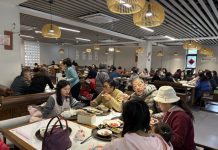From Gao Jiawei
Recently, some Western countries and media have started to question China’s expansion of production capacity in the green industry. “China’s overcapacity distorts global prices and production patterns,” US Treasury Secretary Janet Yellen expressed her concerns, highlighting China’s exports of solar panels, electric vehicles and batteries.
Is China’s green production capacity genuinely in surplus? What has China’s green industry really been shaking up?
Exporting doesn’t necessarily mean there’s too much production capacity.
In the era of economic globalization, both supply and demand operate on a global scale. Once domestic needs are met, surplus products naturally look for markets abroad. Different countries specialize in different industries where they have larger production capacities, while their capacities in other industries are smaller. This difference is shaped by each country’s comparative advantages. If a country produces only for its own market, there would be no international trade to speak of.
Global demands for green industries are far from being met. The International Energy Agency projects that, to achieve carbon neutrality, global demand for new energy vehicles will soar to 45 million units by 2030, over three times the 2023 sales. Demand for new photovoltaic installations is expected to reach 820 gigawatts, nearly four times that of 2022. Moreover, many developing countries have significant demand for new energy products. They require high-quality green production capacity to advance their green and low-carbon transitions. So, where did this idea of “overcapacity” come from?
From a supply perspective, China’s green production capacity has by no means exceeded global demand. In 2023, China produced approximately 9.6 million new energy vehicles, with exports reaching 1.2 million units. Nearly 90% of China’s production capacity is dedicated to meeting domestic demand, while only 10% of its high-quality production capacity enters the global market, engaging in more intense international competition. This export ratio is much lower than that of Germany and Japan.
Labeling China’s green “overcapacity” seems more like a pretext to sanction its green industry. If we follow this reasoning, no country should produce more than its domestic demand. So, should Boeing cut production? Should American soybean farms scale back? And should the military-industrial complex, which continuously exports war, reduce its spending?
Yellen also pointed to China’s government “support” of green production, claiming that subsidies allow Chinese companies to export products at lower prices, damaging U.S. businesses and workers.
But the facts tell a different story. As China’s electric vehicle exports have grown, prices have also gone up. In Europe, leading Chinese electric cars sell at roughly twice the price in China’s domestic market.
In the case of other green products, an article from the South China Morning Post pointed out that the price of solar panel has fallen by 95% since China entered the industry two decades ago.
No amounts of subsidies could have made this happen. The real answer is China’s innovation and scale of production.
Yellen made the remarks at a solar panel manufacturing plant in the U.S., a company that filed for bankruptcy in 2017 due to the lack of market competitiveness. This manufacturer is set to resume production this spring.
Its reopening is precisely due to support from the U.S. government. According to the “Inflation Reduction Act” introduced by the Biden administration, both businesses and individuals can enjoy up to 30% tax deductions for installing photovoltaic systems. And there could be more. The U.S. Treasury has launched a discriminatory policy: projects using solar panels made in the U.S. can apply for an additional 10% tax credit.
So, accusation from the Biden administration of China’s “overcapacity” seems to put itself in an “awkward” position.
On one hand, they claim China’s new energy industry has overcapacity due to government support, and on the other hand, they keep rolling out policies to support the growth of their own new energy industry. Such double standards echo the classic English saying, “Do as I say, not as I do.”
Before visiting China, Yellen said that people like her have always thought that when someone sends cheap goods, you should send a thank-you note, calling it a basic principle of economics. However, she later added that she wouldn’t do that anymore.
What prompted this change? After all, not having the chance to choose more affordable, high-quality products would be a loss for consumers.
The reason is simple. Chinese companies have been rising in position on the value chain in the global market, and the U.S. is losing its advantages. In the past, the West didn’t criticize China’s “overcapacity” because they benefited from it. When Chinese companies were primarily producing parts and goods for global firms, this “overcapacity” allowed customers to negotiate lower prices and increase profit margins. However, as Chinese companies aim to produce and sell their own products, these favorable margins have diminished for them.
In fact, boosting industry capacity and promoting healthy competition among businesses can greatly benefit consumers. For instance, prices of electronics like computers have steadily decreased relative to people’s average income over the past forty years, allowing more people to afford items that were once considered luxury goods.
Once again, the U.S. has chosen to support monopolistic corporations over benefiting their consumers. Raising the idea of so-called “overcapacity” in China’s green industry is trying to justify America’s use of subsidies and tariffs as well as non-tariff barriers to protect its nascent domestic companies. As a result, monopolistic companies can continue to leverage their dominant market position to earn high profits from consumers.
The rapid growth of China’s green industry is a result of technological innovation, a well-established supply chain system, and robust market competition. Perhaps it’s precisely because the U.S. recognizes the true competitiveness of China’s new energy industry that they are feeling deeply anxious, attacking China with the label of “overcapacity.” The U.S. may think that creating such a label can undermine China’s confidence, but it actually disrupts the efficient allocation of global resources, harms consumers and hinders the development of local businesses in the long run.
About the author:
Gao Jiawei, a reporter and commentator with CGTN Radio based in Beijing, focusing on international trade and China’s economy.






